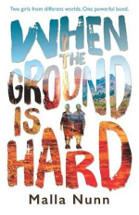When the ground is hard by Malla Nunn

Allen and Unwin, 2019. ISBN: 9781760524814.
(Age: 13+) Highly recommended. Themes: Racism, Colonialism,
Swaziland, South Africa, Friendship, Jane Eyre, Bullying, Crime.
Adele, living in a coloured community in colonial Swaziland is
lucky. Her white father supports his family, visiting now and again,
leaving money but more importantly paying her school fees at a
Christian boarding school eighty eight miles away. With her paler
skin and some money in her pocket she fits in with the pretties, the
top group within the school, those for whom others run errands, the
girls who are excused some misbehaviour because they are fee paying
in a school where many are slow with theirs. Arriving after a long
hot bus trip, Adele realises that a new girl, Sandi has taken her
spot and she is relegated to sharing a room with a poor Swazi girl,
an outcast, Lottie, who doesn't seem to care about the rules they
are forced to obey.
After a confrontation with the pretties, Adele can see Lottie's
future, a poor mixed race girl, clever and pretty but prey to the
white men, just like Adele's mother, a woman whose youth and
abilities are left in a village on the outskirts of a town, hungry
for the scant recognition given by the man who keeps her there.
School is a hive of jealousies and racism, but wanting to fit back
in with the pretties, Adele grudgingly comes to see Lottie in a
different light, beginning to recognise an independence of spirit
that she wants for herself.
Things happen which open Adele's eyes to the small mindedness of the
group she longs to be with: they steal Lotte's only spare pair of
undies, they lie about the fire and spread rumours about her and
Lottie, they laugh and sneer as they pass by.
Lottie and Adele bond further over a shared reading of Jane Eyre,
the story of a young girl sent to an appalling boarding school
paralleling their own situation, and giving them some hope that they
too will be like Jane, exploring ways of being independent.
This is a marvellous insight into colonial racism, the small
mindedness of communities where class is all, the use made of the
local women, leading to their inevitable abandonment.
It is rare to read a book set in southern Africa, and this is
outstanding, revealing the techniques used by the British to keep
control of this small country, eventually relinquishing power in
1968. The school is a microcosm of the divided society, the senior
girls using their pets to run messages, using food as a trading
tool, the staff supporting the ones with money and power, using
petty means to keep control.
When Adele and Lottie realise that one of the boys is missing, they
investigate, but not in the way the school directs, they go off on
their own. It is on this journey that Adele finds out more about her
background, and is caught up by the ugly racism of the school's
Afrikaner neighbour, Bosman.
Nunn has skilfully blended a good tale based upon her own family's
story with enough of Southern Africa's history to give a solid
background to the story. Terms used are those prevalent in southern
Africa in the 1950's when Apartheid was installed, the colour of
your skin deciding your position in society.
Readers will be well used to words such as Swazi and Zulu, or native
and coloured to describe the students as well as Afrikaner when
Bosman comes on the scene, bringing his odious views with him.
In the last few pages we learn of the African proverb, 'When the
ground is hard, the women dance' bringing many of the themes
together, making it a richly layered novel for middle secondary
students.This book lends it self to discussions about racism and
Apartheid, the role of women in society, the drift from rural to
urban societies, finding yourself and of course, Jane Eyre.
Scroll down for teacher's
notes from the publisher.
Fran Knight